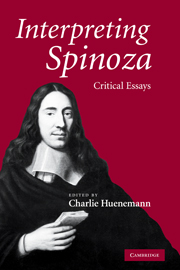Book contents
- Frontmatter
- Contents
- Notes on contributors
- Method of citation
- Introduction
- Chapter 1 Representation and consciousness in Spinoza's naturalistic theory of the imagination
- Chapter 2 Rationalism run amok: representation and the reality of emotions in Spinoza
- Chapter 3 “Whatever is, is in God”: substance and things in Spinoza's metaphysics
- Chapter 4 Necessitarianism in Spinoza and Leibniz
- Chapter 5 Epistemic autonomy in Spinoza
- Chapter 6 Spinoza and the philosophy of history
- Chapter 7 Democracy and the good life in Spinoza's philosophy
- Chapter 8 Spinoza's unstable politics of freedom
- Chapter 9 Should Spinoza have published his philosophy?
- Bibliography
- Index
Chapter 6 - Spinoza and the philosophy of history
Published online by Cambridge University Press: 22 September 2009
- Frontmatter
- Contents
- Notes on contributors
- Method of citation
- Introduction
- Chapter 1 Representation and consciousness in Spinoza's naturalistic theory of the imagination
- Chapter 2 Rationalism run amok: representation and the reality of emotions in Spinoza
- Chapter 3 “Whatever is, is in God”: substance and things in Spinoza's metaphysics
- Chapter 4 Necessitarianism in Spinoza and Leibniz
- Chapter 5 Epistemic autonomy in Spinoza
- Chapter 6 Spinoza and the philosophy of history
- Chapter 7 Democracy and the good life in Spinoza's philosophy
- Chapter 8 Spinoza's unstable politics of freedom
- Chapter 9 Should Spinoza have published his philosophy?
- Bibliography
- Index
Summary
Hegel famously characterized Spinoza as “philosophically inadequate” because he supposedly lacked a proper theory of history. More recent interpretations have qualified and disputed that charge. Some (such as Smith 1997) have argued that Spinoza was central in the transformation of the idea of history from a divine to a secular process. It has also been popular to claim (e.g., by Smith or André Tosel) that there is a theory of historical progress either tacit or explicit in his philosophy. Others (such as Moreau 1994: part 2, ch. 4) have sought to make sense of his views in light of the context of early modern historiography, particularly the recuperation of the idea of “fortune.” In this paper I intend to critique and build on this work by showing the systematic relation between Spinoza's theory of action in the Ethics and his use of historical sources and methods in the Theological-Political Treatise. Further, I shall claim that the use of historical narratives in the TTP is part of a larger pattern of the use of narrative, which can also be found even in the last part of the Ethics.
- Type
- Chapter
- Information
- Interpreting SpinozaCritical Essays, pp. 111 - 127Publisher: Cambridge University PressPrint publication year: 2008
- 3
- Cited by



